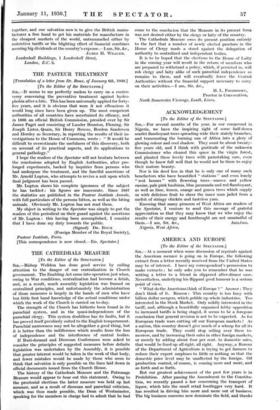THE CATHEDRALS MEASURE [To the Editor of the SPECTATOR.]
SIR,—Bishop Welldon has done good service by calling attention to the danger of our centralization in Church government. The Enabling Act came into operation just when, owing to War conditions, centralization had become a fetish, and, as a result, much assembly legislation was framed on centralized principles, and unfortunately the administration of those measures is largely in the hands of men who have but little first hand knowledge of the actual conditions under which the work of the Church is carried on to-day.
The strength of the Church has hitherto been found in its parochial system, and in the quasi-independence of the parochial clergy. This system doubtless has its faults, but it has proved itself peculiarly suited to the English temperament. Parochial narrowness may not be altogether a good thing, but it is better than the indifference which results from the loss of independence and the interference of central bodies.
If Ruri-decanal and Diocesan Conferences were asked to consider the principles of suggested measures before definite legislation was undertaken by the Assembly, it is possible that greater interest would be taken in the work of that body, and fewer mistakes would be made by those who seem to think that salvation is only possible on the lines laid down in official documents issued from the Church House.
The history of the Cathedrals Measure and the Patronage Measure would appear to bear out this statement. Owing to the proctorial elections the latter measure was held up last summer, and as a result of diocesan and parochial criticism, which was thus made possible, the Dean of Westminster, speaking for the members in charge had to admit that he had come to the conclusion that the Measure in its present form was not desired either by the clergy or laity of the country.
The Cathedrals Measure owes its present position entirely to the fact that a number of newly elected proctors in the House of Clergy made a stand against the delegation of authority to centralized and independent bodies.
It is to be hoped that the elections to the House of Laity in the coming year will result in the return of members who are prepared to withstand a policy, which, if persisted in, will rob clergy and laity alike of such parochial independence as remains to them, and will eventually leave the Central Authorities without the financial support necessary to carry on their activities.—I am, Sir, &c., H. L. FOSBROOKE, Proctor in Convocation. North Somercotes Vicarage, Louth, Lines.






































 Previous page
Previous page